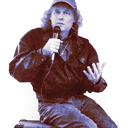I coined a new word, “graptitude,” in a dream a few moments ago. It’s the word “gratitude” with the “p” transposed from “grasp” or “grip,” and it refers to the practice of feeling grateful for the objects in your immediate physical surroundings — the things that are close enough that you can touch them or pick them up in your hands.
This is an idea you might have picked up from The Secret or from the mass of movies and writing that surrounded that work, with the talk about an “attitude of gratitude” and the vision boards made up of pictures that represented a person’s future material surroundings. In keeping with the mystical approach of The Secret, though, it made no attempt to name most of the things it talked about. Graptitude was just one of dozens of ideas that would fall under the rubric of Low of Attraction.
And graptitude is one of the simplest demonstrations of Law of Attraction. If you feel good about the physical objects that are around you already, it becomes easier for you to collect the material possessions you really want. This works, as countless rags-to-riches stories attest, even if the physical objects you see when you start out aren’t your own possessions. It works even if the things around you don’t have any worldly value. It works because feeling good about material things makes it easier to own material things, including the things you ideally would like to own.
Well, okay, but what if the story you want to create is not a rags-to-riches story, but a clutter-to-riches story? The situation that most of us face is not that we hardly own anything, but that we own a great many things that we don’t use. Do you really want to feel graptitude when you are surrounded every day by junk that gets in your way? And even if it would help, is it possible to feel good about “all this junk”?
The simple answer to both questions is yes. If you feel good about the junk and clutter that’s in your life, you will replace it faster with the possessions you imagine for yourself. And it is easy to feel good about the worst possessions if you realize that they are not permanent, that they will not simply sit inertly forever, but that they are in motion, like the rest of the universe.
Feeling good about clutter doesn’t lead you to collect more of it — it makes it easier to move it out and replace it with something better. This is easy to see when you recognize how much difference there is between feeling good and clinging. If you feel attached to possessions you don’t use, that’s not a form of love. Just the opposite. It’s fear — fear of what will happen to you if you let go. It’s the “fear of nothing,” the fear of being left without any material possessions at all. In Law of Attraction terms, that is the opposite of what you want. You feel bad and focus your emotions on material deprivation, and that makes it hard to get anything you want. You get what you want faster if feel good about the clutter that currently stands in the way, and this is easier to do if you see the clutter in motion. It’s easy to applaud a bag of junk that’s on its way out to the trash. And when you see the universal process of change in all your stuff — when you know that it is all on its way out eventually — then it is also possible to applaud it as it is now, even if it is not yet being carried out in a bag or a box. That will happen soon enough. In the meantime, every possession you have is evidence of your ability to attract — an ability that, in the bigger picture, includes attracting the big things you are hoping for.
Picture this. A magician promises to pull a deck of cards out of an empty hat. You watch him to see how he will do it. He reaches into the empty hat and pulls out a map of the London Underground and presents the map to you. You unfold it and look at it. It’s the genuine article — you see the words “Tube map” is the corner, and there’s the River Thames running through the middle of everything — but it’s hardly a deck of cards. So how do you respond? Do you respond angrily, saying, “You’re no magician! This isn’t a deck of cards, it’s just a map!” Or do you chuckle at the joke, and hand the map back to the magician so he can turn it into a deck of cards?
Obviously, it makes more sense to play along with the magician. When you say, “This is only a map of the London Underground,” it is a mock protest. You are not actually disappointed. The map might not be what was promised, but it is still proof of the magician’s abilities, and the deck of cards will appear soon enough.
You can see your own clutter in the same way. If it is not exactly what you wanted, it nevertheless serves as a place-holder, a temporary token of your ability to have material things. All that works out fine if you let it. The problem with clutter arises only when you hold on to things too long, after they have outlived their usefulness in your life. You do this not from graptitude, not because you really like and enjoy the things, but out of fear. Set the fear aside and keep things flowing, and you too can have your version of the clutter-to-riches story.


No comments:
Post a Comment